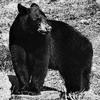- black bear
-
a medium-sized North American bear, Ursus (Euarctos) americanus, relatively common in uninhabited mountainous areas, ranging from light brown to black with a straight brown muzzle: northern populations may be gray to near-white. See illus. under bear.[1735-45]
* * *
Forest-dwelling bear (Ursus americanus) that, despite reductions in population and range, is still the most common North American bear.The adult ranges from 5 to 6 ft (150–180 cm) in length and weighs 200–600 lbs (90–270 kg). It has various colour morphs but always a brown face and usually a white chest mark. It eats animals and vegetation, including pinecones, berries, and roots. It frequently raids campsites and seizes anything edible. Though it may be tamed and taught tricks, it often becomes dangerous when mature. American black bear (Ursus americanus)Leonard Lee Rue III
American black bear (Ursus americanus)Leonard Lee Rue III* * *
▪ mammalalso called American bearthe most common bear (family Ursidae), found in the forests of North America, including parts of Mexico. The American black bear consists of only one species, but its colour varies, even among members of the same litter. White markings may occur on the chest, sometimes in the shape of a V. Depending on their colour variations, black bears are often referred to as cinnamon bears, blue-gray or blue-black glacier bears, and white bears (found mainly on Princess Royal Island, British Columbia). Black bears that are actually brown in colour are most common in western North America. They are sometimes called brown bears, but the true brown bear (Ursus arctos; also called the grizzly bear in North America) is much larger.The black bear is large and stocky and has a short tail. Adults range from 1.5 to 1.8 metres (5 to 6 feet) in length and weigh 90–270 kg (200–600 pounds). Males can be up to 70 percent heavier than females. The head is small but is supported by a strong neck. The ears are small and rounded. The curved claws are nonretractile, and, unlike cats and dogs, bears walk on the soles of their feet (plantigrade locomotion).Though classified as carnivores, black bears have an omnivorous diet. In spring they consume emerging plants and carcasses of animals that have died during the winter. Fruits dominate the diet in summer, and both fruit and mast, especially acorns and beechnuts, constitute most of the fall diet. As opportunistic feeders, black bears will also eat pinecones, roots, ants, and honey from wild or domestic bees. Nonetheless, black bears are strong predators, and in some areas they frequently kill moose calves and deer fawns during spring. Black bears living near humans adapt readily to alternate food sources, such as garbage from dumps or campsites and handouts from tourists in parks. Human encounters with black bears occasionally result in injury or death, and attacks are reported every year. In almost all cases, avoiding surprise encounters is the best defense, as black bears prefer to avoid people.Throughout most of their range, black bears become dormant during winter. They spend the winter in dens located in rock crevices, in underground burrows, under tree roots, in hollow trees, in brush piles, or simply on open-ground beds. Prior to winter sleep, bears must accumulate large quantities of body fat during late summer and fall. Not only does this enable them to survive the long period of winter fasting, but it also allows them to have sufficient energy in spring when they emerge and food is rare. For females, the amount of fat stored before winter is linked with reproductive success: fatter females typically have more and bigger young than do leaner females. Accumulating fat for the winter is thus a strong drive, and it explains the constant search for food through the summer and fall.Black bears are not territorial; they are mostly solitary, and the home ranges of both males and females may overlap. Home ranges typically are larger where food is less abundant and smaller where food is plentiful. Throughout Canada and the United States, home ranges of black bears extend from about 40 to 200 square km (15 to 77 square miles) for males but are considerably smaller for females. Breeding begins in the spring and peaks during June and July. Black bears are promiscuous, males and females often mating with several individuals. Implantation of the fertilized egg is delayed, occurring in November or December. Actual gestation then lasts 60–70 days, and one to four young cubs are born in January or February. Born blind, fully furred, and toothless, the cubs remain with the mother for 16 months, and the female breeds every second or third year. Although the mother is very protective of her litter, young cubs may be killed by coyotes, wolves, brown bears, or other black bears. Black bears can live for more than 20 years in the wild, but in areas near human habitation most black bears die sooner as a result of hunting, trapping, poaching, nuisance removal near campgrounds or dumps, and collision with vehicles.In natural habitats, black bears are active during the day. However, in areas of high human activity such as dumps and campsites, black bears often become nocturnal to avoid encounters with humans. Even so, black bears habituate quickly to handouts given by tourists, and this lack of fear of humans often leads to conflicts. In parks, human-habituated bears often must be killed as they become hazardous around campsites. Not feeding wild black bears is therefore better for both humans and bears. The black bear may be tamed and taught various tricks, and it is a common performer in circuses and other animal acts.The Asiatic black bear (Ursus thibetanus) is similar to the American black bear in size and appearance.* * *
Universalium. 2010.
